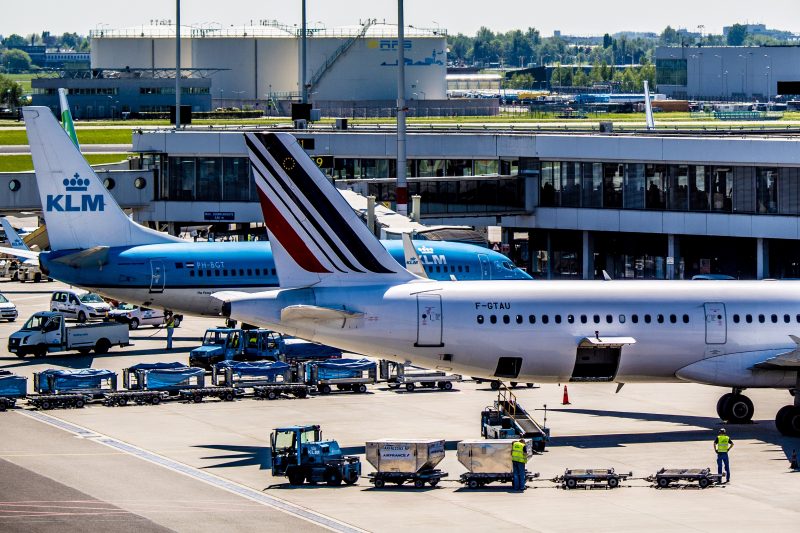Dutch prove not so laissez-faire with Air France-KLM shock
Amsterdam’s Schiphol airport and KLM are icons the Dutch won’t let anyone meddle with (Robin Utrecht)
The Hague (AFP) – When the Dutch government announced its surprise purchase of a stake in Air France-KLM, it didn’t just upset the French government but also a host of national stereotypes.
Wasn’t it the Netherlands that was long viewed abroad as a champion of free markets and an opponent of the heavy hand of the state in key industries?
And wasn’t it the French — whose outrage at the “unfriendly” Dutch act belied the fact that they hold an even bigger share of the alliance — who were normally in favour of interventionism?
But experts said Wednesday that while the Dutch move came out of the blue, it reflected a wider tendency in the business-minded Netherlands to protect its major corporations in an uncertain world.
“There is real concern in the Netherlands at what many people see as flagship company being lost,” Michiel van Hulten, a Dutch former MEP and now Brussels-based consultant, told AFP.
He added that the “central rules” of Dutch economic policy are “don’t touch” banking giants ABN-AMRO or ING, the port of Rotterdam, oil behemoth Shell, or “Schiphol-KLM”.
“The Dutch government is traditionally very free-market oriented. But when there’s a feeling that vital national interests are at stake… they are ready to intervene.”
– ‘Losing our businesses’ –
French President Emmanuel Macron has demanded “clarifications” from the Netherlands about the purchase of the 12.68 percent stake, which Dutch Prime Minister Mark Rutte only told him about minutes before it was publicly revealed by The Hague.
However the Dutch are famed for plain speaking and Finance Minister Wopke Hoekstra was clear about the motives at a press conference to announce the purchase late Tuesday.
Hoekstra said it was to “ensure the Dutch public interest” and to have a “seat at the table”, with the Netherlands eventually aiming to match France’s 14 percent stake.
Air France and KLM have continued to operate as separate brands since their merger in 2004 but the marriage has been a troubled one due to strikes in France and growing suspicions on the Dutch side.
Fears that KLM’s position was being “eroded” within the 15-year-old Air France-KLM alliance, and a major row over the reappointment of the Dutch arm’s chief executive, played a key role in the decision.
The Dutch government has also been explicit about the importance of KLM to Amsterdam’s Schiphol Airport, one of Europe’s busiest hubs, amid fears that any change could cost tens of thousands of jobs.
“There is a fear that our national airline will be absorbed by the bigger Air France, or that it will become a victim of the financial situation at Air France, which is worse, and will have to help prop it up,” Roel Beetsma, an economist from the University of Amsterdam, told AFP.
The Dutch response went beyond just KLM, however.
“I was surprised by the move, but on the other hand it corresponds to a political vision that is starting to change,” Beetsma added. “There is a growing feeling that we are losing our businesses and I think it was a reaction to that.”
– Shadow of Brexit –
The Netherlands holds regional elections in March, so a show of strength in protecting a Dutch company was also likely to be a vote-winner, analysts said.
The shock Dutch move must also be seen in the wider context of Europe, in which the Netherlands has long tried to stop a Franco-German axis bossing around smaller countries.
The Dutch have recently rowed with France over eurozone reforms, while a recent push by Paris and Berlin to weaken EU competition laws “will be seen as worrying in The Hague in terms of a small country with an open economy” van Hulten said.
The shadow of Brexit is also falling on the Netherlands and Europe’s political balance of power.
“This is traditionally the kind of area where the British government would have been at the forefront of the fight to maintain free markets and where the Dutch would have been allied,” added van Hulten said.
“The Dutch may feel they are somewhat cornered in Europe now.”
Disclaimer: This story is published from a syndicated feed. Siliconeer does not assume any liability for the above story. Validity of the above story is for 7 Days from original date of publishing. Content copyright AFP.


